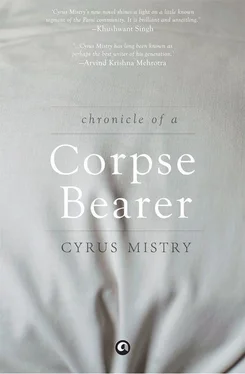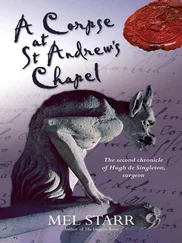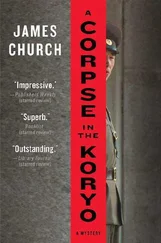Of course, I was too young to actively experiment with these moral quandaries. I suppose, if I had some pocket money, I might have. But, in fact, I remained always on the periphery of these goings-on, more a spectator than a participant, somewhat dazzled though, I do confess, by the riotous and undeniable vitality of wickedness. Only once, I have to admit, when I had, by chance, saved up on days of tram fare, I succumbed, following a buxom banana-seller into the stairwell of a dilapidated building where, alas, my anticipation of promised pleasure was so intense it was all over and done with in a flash; and I, wet and sticky in my underpants, was poorer right away by three rupees and five annas.
Then again, there were other places I wandered in, where you might least expect to find the son of a Zoroastrian high priest given the horror of contamination our people are susceptible to. The Muslim burial grounds at Charni Road, Chandanwadi, the Hindu cremation field nearby, where pyres burn and smoulder at all hours of day and night, even the ruins of the burial ground for British soldiers at Land’s End, beyond the Afghan War Memorial. I spent several hours here trying to read the quaintly sentimental or eerie inscriptions on broken tombstones and defaced engravings embedded in the earth.
Was it some prescient foreboding of my destiny that drew me to these terminal resting places? And afterwards, when I returned home to sleep in my own bed at night, I never once cleansed myself, never took the ritual bath necessary to wash off such spiritual ordure as presumably clung to me, and I carried back into my father’s fire temple. He would have been horrified, had he known of my polluting misdeeds. Even now, if there is an afterlife, and he has divined my awful secret, I’m not sure he’ll forgive me.
At least two or three times, I remember walking through the relatively deserted afternoon streets to the Muslim cemetery at Charni Road. Bombay was never so hot in those days as it is now. It was warm, but there were always soothing and balmy breezes blowing from the sea, even when it wasn’t high tide.
I was surprised to find several well-dressed men, both middle-aged and old, as well as the very poor and pathetic, stretched out on low cots smoking long pipes through the evening, dreamily self-absorbed. Later, one of the men in charge here told me it was afeem, or opium, they were smoking and, if I wasn’t interested in having any, I shouldn’t come there at all. He offered me a free trial smoke if I wanted one. I did, but it only made me cough and feel nauseous.
The Hindu cremation grounds were livelier, if only for the bright fires, the crowds of mourners, the chants, the pyramids of wood kept in readiness; and, of course, the body handlers in charge of laying the corpses atop the prepared pyre. Often enough, these latter were drunk as lords.
I went to a Parsi-run school, but I was more than familiar with certain Biblical sayings: ‘As you sow, so shall you reap’. When I think of all that went awry in my life, I wonder sometimes if those cruel twists and turns of fate were not simply meet punishment for a fatuous giggler who even in the face of the divine could never contain his asinine impulses. There’s one incident from my distant past that embarrasses me still when I think of it. This was before I met Seppy. I had just rediscovered the vast grounds of the Towers of Silence. Thrilled that such a lush arboreal kingdom could exist in the heart of the city, I spent hours on that occasion wandering alone among its gardens, orchards and copses. Before I turned to go home, I came upon a small heap of brambles, twigs and weeds, obviously swept into a corner off the walkway by some mali, and fired. A small bonfire was crackling and dancing in front of my eyes. As I stared into its radiant centre, fascinated, I felt a strong urge to pee.
Now fire, for any Zoroastrian — even one that is consuming garbage — carries an inescapable association with the Holy Fire. There was definitely a perverse impulse behind the sudden urge. But I was young, and my bladder was healthy. After a moment’s indecision, I simply turned away and walked home.
Whatever was wrong with me then probably remains unchanged. A part of me frivolously drawn to evil, allying willy-nilly with Ahriman’s dark legion. .? Nonsensical thoughts, such as these, make me laugh. As an old man, I do feel remorse for my childish extravagances. But another part of me could never regard itself, or life, with such joyless earnestness.
When I look back at that time I see now how apt it is that the graph of my life should have begun to ravel thus. Impossibly entangled in a maze of lies of my own creation, I grew increasingly fearful and restive that soon, my dishonourably appropriated freedom would be denounced, my wickedness brought to light and I, publicly shamed.
Surprisingly, my school hadn’t communicated any concern to my parents about my unflinching absence from its extra coaching class (having concluded, perhaps, that I had given up my intention of essaying a second attempt). In this frame of mind, increasingly apprehensive about my clandestine wayfaring in the city, I decided to put an end to it. But more pertinently, these aberrant tramps became unnecessary and devoid of meaning at around this time, for I had just discovered once again, and quite by chance, that the most beautiful and, moreover, completely secluded island of peace in the entire city was located no more than ten minutes’ walk away from my own home.
I speak of Doongerwaadi Hill, the estate of the Towers of Silence which, in those days, was largely deserted, wildly overgrown with vegetation and fruit, and to which access could be had from five or six different points of entry. As a child I was probably taken there once or twice to attend family funerals, but I had practically forgotten its existence. Nor were there any security personnel around in those days, to stop unauthorized entry. From thereon, I began to spend all my time in the sanctuary of its woods.
During a funeral I accompanied Mother to in this period, I caught my first glimpse of her in the far distance. Long-boned and gangly, with a shock of thick uncombed curls, a wild-looking creature about my age. .who was she? What was she doing there all by herself in the woods?
There was something strangely beautiful and desolate about her. Or perhaps, about the setting I spied her in. Anyway, I was completely fascinated. My pursuit of favour with Sepideh — for that was her name, I discovered later, a name deriving from Persian lore — began that very afternoon; for I went back to look for her, soon after I had seen Mother home.
My courtship of this strange creature of the woods was almost wordless. The dense florescence we were surrounded by — this could well have been a tropical forest in some remote part of the world — only heightened our sense of naturalness, our knowledge of the intrinsic validity of what we were about. We felt happily in-apprehensive of being disturbed by the world of adults. Spontaneously, and quite fearlessly, we discovered together, the tremendous world of sexual love. And we were adult enough not to shrink from it — from the responsibility of it — from understanding, in a complete sense, that from this moment on, there was no going back.
When I went back to Doongerwaadi that afternoon, the sun had dropped low, and the forest was filled with shadows. I spotted her almost immediately, though, reclining on the low-drooping bough of a mango tree with her eyelids shut. Sepideh looked so relaxed, at first I wondered if she was asleep. So raw, so natural lying there in the dusky half-light, I imagined I might have walked into a dream. She must have seen me at the funeral that morning, for she opened her eyes as I approached, and smiled shyly. But on that first occasion, I could not speak to her. A disembodied voice called out from afar:
Читать дальше












